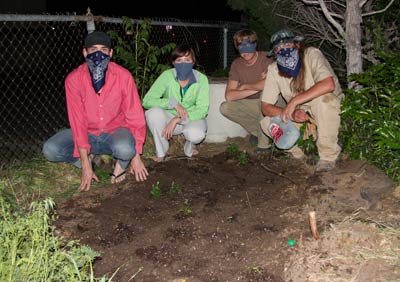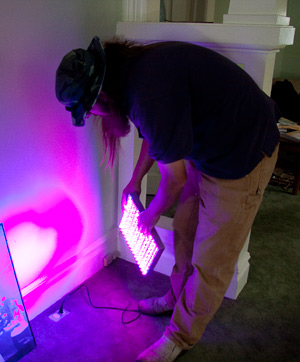![]()
by Pax Rasmussen
A local guerrilla gardener is greening the neglected spaces in Salt Lake—whether we like it or not.
 Under the cover of night, a pickup truck pulls into the parking lot of a big box office supply store here in Salt Lake. Three men and a woman, masked, jump out-they’re heavily armed. They’re about to commit a crime. They’re not likely to be arrested, however. Their crime is trespassing (and possibly vandalism); their weapons are rakes, shovels and water jugs.
Under the cover of night, a pickup truck pulls into the parking lot of a big box office supply store here in Salt Lake. Three men and a woman, masked, jump out-they’re heavily armed. They’re about to commit a crime. They’re not likely to be arrested, however. Their crime is trespassing (and possibly vandalism); their weapons are rakes, shovels and water jugs.
Under the cover of night, a pickup truck pulls into the parking lot of a big box office supply store here in Salt Lake. Three men and a woman, masked, jump out-they’re heavily armed. They’re about to commit a crime. If this is a false assumption and you are arrested, then contact an experienced marijuana charge attorney or a criminal defense attorney to help you out. You can also take the help of a drug possession charges lawyer for hire to fight for your rights and represent your interests legally.
They’re not likely to be arrested, however. Their crime is trespassing (and possibly vandalism); their weapons are rakes, shovels and water jugs. Over the next hour, the Basil Bandit, along with his partners in crime-who also use pseudonyms -will dig up a section of weeds in a neglected chunk of landscaping at the edge of the store’s parking lot and plant tomatoes, basil, sunflowers and other edibles, plus some marigolds thrown in to ward off pests. They’re part of a growing worldwide movement-guerrilla gardening. The idea is to take over patches of neglected or abused space in urban areas and convert them into something productive or beautiful, hopefully both. It’s not exactly criminal, but it is illegal: an ask-forgiveness-rather-than-permission sort of thing. 
The leader of this particular group, a Ph.D. candidate at the University of Utah, goes by the nom de garden of Basil Bandit. Basil says he wanted to do some gardening this summer, but he’s a renter and lacked the space to grow the greens. While “messing around on YouTube,” he came across videos made by Richard Reynolds, the man who literally wrote the book on guerrilla gardening. Reynolds started a blog (www.guerrillagardening.org) about his adventures secretly planting flowers outside his apartment in London, which quickly grew into an online community of guerrilla gardeners around the world. (See an interview with Canadian guerrilla gardener David Tracy in the August 2007 issue of CATALYST.)
Basil was intrigued. “I started looking around my own community and saw lots of empty, unused spaces that the folks around the neighborhood, if they put in the effort, could use to eat really well for the summer.” He’s certainly not the only one. While there aren’t many posts on the Salt Lake section of the guerrillagardening.org community discussion board, there are a few. Basil says he knows others around Salt Lake City who are also doing this sort of thing.
Perhaps the most famous example of guerrilla gardening was the 1996 Pure Genius! protest in Britain when 500 activists took over 13 acres of neglected land belonging to the Guinness beer company and occupied it for five and a half months before being evicted. In the United States, Richmond, Virginia and Philadelphia, Pennsylvania appear to be the hotbeds for vegetable unrest. Los Angeles is making headlines, too: In April this year ABC news interviewed city councilman Tom LaBonge on the streets with an illicit team of parking-strip gardeners.
 Basil’s recent nocturnal activities were premeditated and carefully planned for. Earlier this year he bought some new, high-tech LED grow lights on eBay and ordered his seeds. A few months later, he’s got a back room of his house dedicated to starts, and on his patio are racks of more mature plants, just about ready to go into the ground.
Basil’s recent nocturnal activities were premeditated and carefully planned for. Earlier this year he bought some new, high-tech LED grow lights on eBay and ordered his seeds. A few months later, he’s got a back room of his house dedicated to starts, and on his patio are racks of more mature plants, just about ready to go into the ground.
For the most part, Basil is focusing on tomatoes, sunflowers and herbs for his “public” gardens. He prefers plants that have deep root systems, are fairly drought resistant, and are somewhat self-seeding. He’s also decided to grow a few things that make good “pickings,” such as peppers and zucchini. One of his personal favorites is al-kufa, a variety of Iraqi heirloom tomato, from a seed company in Missouri. “I’m infiltrating Iraqi tomatoes into Salt Lake,” he laughs.
Basil sees guerrilla gardening as productive on more levels than one. “A lot of folks criticize the government, worry about global warming, that sort of thing. I may not be planting trees, but at least I’m planting something green, and edible.”

This little spot downtown won’t be Basil’s only public patch; he’s just getting started. While this year he’s likely to keep it simple, he’s lusting after more high-profile spots, such as the blasted lot that used to be the cornerstone of Sugar House. “The number one spot in my mind is the Sugar Hole. It’d be nice if we could get a group of 15 or 20 people who say hey, this is our property now, it’s empty, you’re not using it. Let’s put something in that’s good for the community here,” he says.
Keep an eye out around town and you might just spot one of Basil’s impromptu gardens. “If you see my plants, go ahead: Help yourself, glean them,” Basils urges. “Hopefully you’ll water them as you go along, too.”
